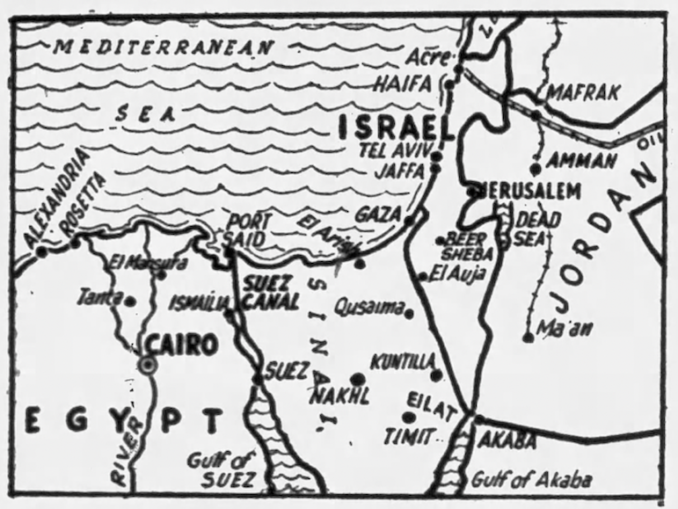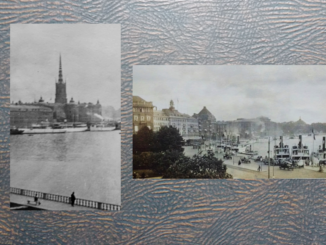
Israel,
Unknown artist – Newspapers.com, reproduced with permission
In 1957 my uncle, John Alldridge visited Israel for the Birmingham Mail. This is the fourth of his reports. – Jerry F
Kefar Hanasi, Upper Galilee
Not so very long ago, Gershon Epstein was a junior clerk in the City Treasurer’s Department at Manchester Town Hall. Today he keeps the books and generally balances the budget for a self-contained community of 255 men, women and children who live on a hilltop that looks down over the Jordan Valley at the northernmost tip of Israel.
He has lived here for nearly nine years: at the beginning under conditions that would have broken the heart of the toughest Canadian backwoodsman.
From the window of his one-roomed house, as sparsely furnished, almost, as a monk’s cell, you can see a memorial to those early years. A cairn of stones, as high as the average slag heap: stones scraped out of the defiant earth dumped there by human hands.
When, in future, I hear talk about the faith that can move mountains, I shall remember that rock pile. What happened here on this bare, wind-swept, sun-scorched hilltop is nothing short of a miracle. Less than ten years ago it was a stony wilderness, poor grazing ground for a few flea-bitten sheep and goats. Today acres of it are under barley and wheat. On the sheltered slopes that face the Jordan and the Syrian border are vineyards, and orchards of apples, plums and pears.
There are fish ponds where carp are bred and taken alive to the market in Tel Aviv. They have cleared the scrub and lifted the rocks and laid out a stock farm where they raise sheep and cattle and poultry. There is even a small foundry which makes aluminium couplings for water pipes.
Last year Gershon was able to show an annual turnover of £200,000.
All this is the combined achievement of a handful of men and women, nearly all of them originally from Britain and the Commonwealth – men and women who, ten years ago, barely knew a tractor from a pruning hook.
For men like Gersh Epstein it has meant working a 12-hour day six days a week for exactly nothing a week. And on rations that would start a riot in a British gaol.
They call themselves kibbutzniks. The agricultural settlement they have established here is a kibbutz. There are 225 kibbutzim in Israel, with a total population of 77,818. Which means that one Israeli in 20 is a kibbutznik.
The Israeli you meet in a kibbutz has little in common with the Israeli you meet, say, in Tel Aviv or Haifa. The violent difference explains why in Israel they say the world is divided into two kinds of people; those who can live in a kibbutz and those who can’t.
I am one of those who can’t. I could never live as Gersh does. I could not live without money in my pocket, dependent on the community for everything I needed, down to a new toothbrush and the odd packet of cigarettes.
I would never be prepared, as Gersh is, to hand over my children to be brought up by experts, so that I would only see them for three hours a day. I could never submit, as Gersh must, to a life that is planned so much for the common good that the individual hardly counts at all.
But then I would be no good at shifting stones. Or milking sheep, or living on hard-boiled eggs and watery soup and cocoa as Gersh so cheerfully does.
And if, by all this, I have given you the impression that Kibbutz life is cheerless and ascetic, then I’m sorry.
It may not be the life for me, but I can still find it stimulating and intensely exciting. Never have I seen so many contented and completely happy people gathered together at one time and in one place.
Bear in mind that most of the people in this particular kibbutz are young-middle-aged, middle-class folk like you and me. They have come from the same kind of homes and have enjoyed the same interests. The only real difference between Gershon Epstein and John Alldridge is that Gershon is a Jew. Which, I suppose, explains everything.
Before they came here they were insurance agents, university dons, typists, motor mechanics, shop assistants, salesmen. Hardly the pioneer stuff, you would have said.
Then you look across to those cornfields, green now and stirring in the wind; over the young apple trees; and back again to those rows of tiny bungalows, each with its tiny patch of garden, bright with marigold and sweet pea. And you can understand – if you cannot explain – why men like David Levy found their way here.
They call Dave “The Man Who Came to Dinner.” With good reason. Five years ago Dave Levy was a prosperous and successful estate agent in England. Then he came out here for a fortnight’s holiday. He never went back.
Dave still looks like a successful estate agent; plump, urbane, full of good stories. Yet just now Dave is working in the vineyards. He takes more pride in a tender young shoot saved from the frost than ever he did out of selling a row of sunshine semis.
“It’s a funny thing,” he says. “Before I came here all my life was spent chasing after money. And I thought I was happy. Now I haven’t a bean, I know I wasn’t. Can you explain it?”
I can’t. I wish I could. I might be all the better for it if I knew the answer to that one.
Only one thing worries me about all this. I’m thinking of the children. That rising generation of “Sabras” who have known no other life but this. (And, let me say at once that I have seen no finer, healthier, more intelligent children than those I have seen here in Israel.)
I hope they won’t take it all for granted. The sacrifices their parents have made for them and their country are surely without equal in this troubled century.
It is unlikely that they will.
They understand, I am sure, without being told, that the future of this new-found State of Israel rests very largely in the hands of these latter-day Children of Israel.
If this fit-to-bursting love of country, this overwhelming sense of national pride does not deteriorate in time to simple arrogance, then the world – and Israel – has nothing to fear.
Reproduced with permission
© 2024 Newspapers.com
Jerry F 2024



